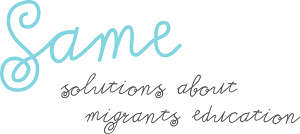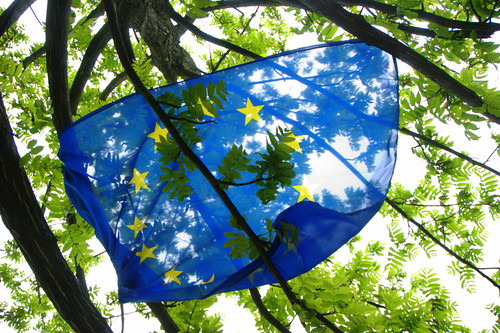Partners involved
 This project involves 6 partners from different countries: Germany, Sweden, Austria, France, Turkey, Switzerland. The coordinator is HochVier from Germany.
This project involves 6 partners from different countries: Germany, Sweden, Austria, France, Turkey, Switzerland. The coordinator is HochVier from Germany.
HochVier - Gesellschaft für politische und interkulturelle Bildung (DE)
HochVier was founded in 2004 and is situated in Potsdam and is the capital of the region Brandenburg which is situated around the german capital Berlin. The regions of Berlin and Brandenburg have to deal with mirgation especially from Turkey, Eastern Europe and Vietnam. Some areas here have a very high percentage of migrants for example there are some schools that have an percentage of migrants that is higher then 80%.
HochVier e.V. works in the field of adult education, human rights/democracy, intercultural communication, regional development and alot more. HochVier e.V. organises workshops and projects in the field of adult education and human rights/democracy for example about latin america or africa. HochVier e.V. tries to involve migrants as Teachers or Staff in the organisation and accomplishement of these workshops and projects but also as learners. HochVier e.V. also tries to use creative methods in the field of adult education and human rights/democracy like simulation of problems through simulation games.
For HochVier e.V. the learning partnership can contribute to more participation of migrants in our courses and workshops by knowing more about how to teach, motivate and train them. Also HochVier e.V. wants to experience new creative methods for teaching migrants so that we can use them in our own workshops and projects.
C3L Centrum för livslångt lärande (SE)
Centre for Life Long Learning (C3L) was originally founded in 1976 as an evening school for adults. It was called Tyresö Kommunala Vuxenskola (Komvux). Most of the educations were in general subjects like languages, mathematics and science. Around 1980 it became a public financed unit of its own and then vocational education in e.g. computer handling at basic level became a part of the education supply. At the same time more students had courses at day time. In the year of 1995 C3L got its present location and it was then possible to expand the number of vocational educations (IT, restaurant educations e.g.) beside the general theoretical educations like Swedish as a second language for migrants. Today C3L gives general theoretical and vocational education both daytime and in the evenings in e.g. IT, care of the elderly, economics, being a nurse for children and lorry driving as well as in some more advanced college computer educations. C3L also gives further education for the Tyresö municipality employed staff, regional education in cooperation with the county labour board and nationally in cooperation with some colleges and universities. The number of students is at present 600, of which 45% are from countries all over the world.
C3L is open for anyone who for some reason has not received his or her basic and/or upper secondary exam or migrants who want to study vocational Swedish intensively. The aim of the school for the migrant adult group is to teach them first a new second language (L2) at level B2, enough to participate in upper secondary education or to pass a vocational education to getting into the labour market. As the educational basic level is very different within the migrant group, a deeper understanding of the differences in languages and how to teach and what the effect is on the L2-learner is necessary. Our aim within this Grundtvig project, is therefore to compare how migrant adult students are being motivated and taken care of didactically and pedagogically in different European countries as well as a recently launched second language project at C3L to give extra language support for vocational adult migrants, not to finish their studies without a diploma, will be our main focus and contribution to this Grundtvig project. We have recently also started to teach Swedish as a second language to professionally educated migrants who want to study vocational Swedish intensively.
Die Kärntner Volkshochschulen (AT)
Laboratoire pédagogique du Greta du Velay (FR)
The Greta du Velay is a regional group of 21 public educational institutions under the wing of the Ministry of education. With 45 trainers, it provides courses for adults in several areas (audiovisual, languages, key competences, etc.). Certified ISO 9001, it exists since 1975. Half of the activity consists in supporting disadvantaged groups towards social and professional inclusion (migrants, unemployed, disabled persons, women returners, rural inhabitants). The other half consists in supporting SMEs in their learning processes. Its transversal expertise includes training needs analysis, course design, trainers training, development of learning services based on ICT. Since 1992 it is running a specific training course for the labour integration of people in prison. It also integrates prisoners with electronic bracelets in vocational training courses. It is a member of the 258 Greta network in France. It employs 4 training advisers and 40 trainers.
The Greta du Velay delivers courses for immigrants to learn French and to be integrated in work and society. It has produced reference and training materials (eg. http://citim.velay.greta.fr, http://afip.dedi.velay.greta.fr), organized conferences ("Intercultural dialogue", "Migrants and IT"), videos and debates ("From management to migration"), strategies (http://epil.dedi.velay.greta.fr).
http://cri.velay.greta.fr (website of the pedagogical laboratory: tools, learning contents, etc)
http://www.velay.greta.fr (training center news)
Düzce Üniversitesi Eğitim Fakültesi (TR)
University of Duzce, Faculty of Education is located in the area of people mostly migrated domestically within the country. Various ethnic folk cultures were still sustained within the society as sign of cultural diversity. Migrants of the society have usually appreciate their own culture and others harmoniously without hesitation. We are living in a region that is mostly constructed migration within the country. Some of them from former Russian ethnics, some from Balkans and some from Arabic and Eastern nations all of which were once ruled by Ottomans. Although they are not Turkish origin, they have long been lived in harmoniously and solidarity.
Having experienced these multi ethnic diversity, we could exchange ideas and share in a group. Our role will be presenting how so many diversified nations and ethnics have survived for a long time without conflict. University of Duzce, Faculty of Education is an educational unit responsible for serving students and adults in various subjects such as training, family support, university and post university education, leadership for women and administration. It has been serving as an educational institution since 1995 as technical education department but institutionalized as unique department of education in 2011, for advising students and families to support them and continue to do research together with local authorities. We have courses for students and adults to at various subjects such as effective communication, classroom management for teachers, school family cooperation, language courses for students and adults from different backgrounds. Although we do not call them minorities generally, they have their own traditional language and cultures still surviving in their society, but trying to integrate with others. Our students and participants could sometimes display their ethnic characteristics that are still surviving and mentioned others that are no longer appeared. Our courses usually focus on contributing their social abilities, some academic information, pupil related courses and school success.
Verband der Schweizerischen Volkshochschulen (CH)
Swiss Adult Education Association (Verband der Schweizerischen Volkshochschulen - VSV) was established in January 1943 as an Association for the benefit of the Adult Education and is seated in the city of Berne, Switzerland. VSV brings together more than 100 Swiss Institutes of Adult Education, in all four speaking regions and represents them on national and international level. Each year we carry out more than 11'000 courses attended by 160'000 persons.
Amongst others, the aims of Association are following: Promoting adult education and integration into a lifelong learning system; Development and expansion of national universities, regional and cantonal organisations Fostering cooperation between our members; Support of our members in their activities Presenting our members’ interests at national and international level and collaboration with other institutions. Boards, committees, working groups and representatives of languages, informatics and integration work for the Association. The Association (VSV) will be actively involved in all project activities, given its extensive experience with the target group. Furthermore VSV will organise a development meeting in Switzerland, will program a website to show the results of the learning partnership and will be actively involved in all work activities.


 SAME is a
SAME is a